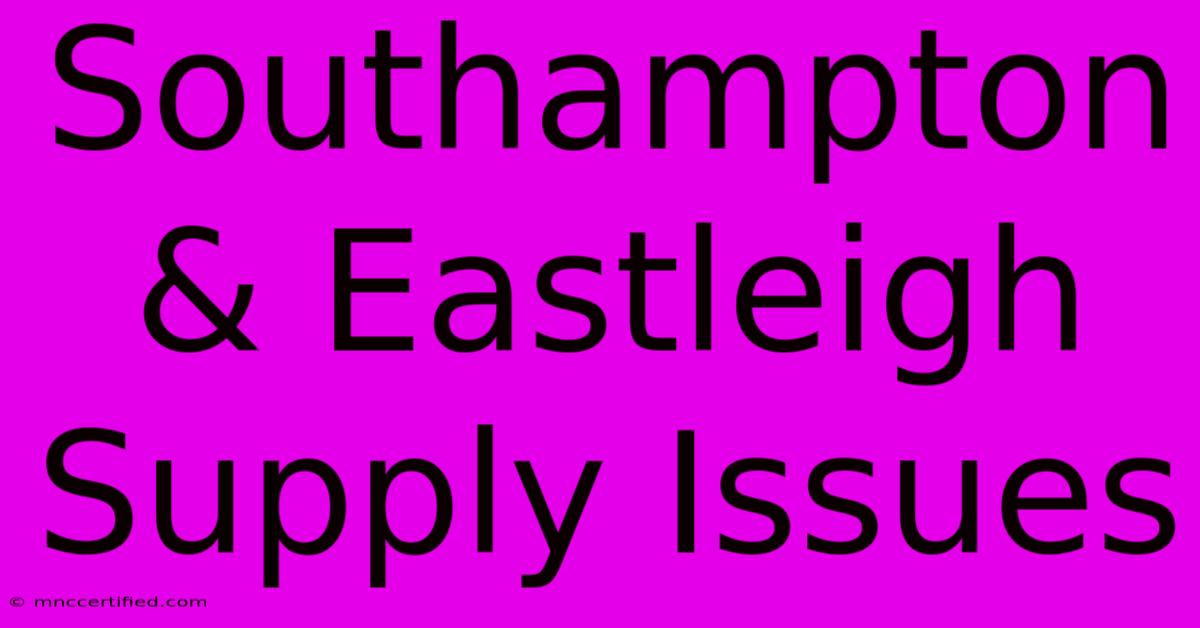Southampton & Eastleigh Supply Issues

Table of Contents
Southampton & Eastleigh Supply Issues: Navigating the Challenges
Southampton and Eastleigh, while geographically close, face distinct yet interconnected supply chain challenges. Understanding these issues is crucial for businesses, residents, and local authorities alike. This article delves into the specific problems affecting both areas, highlighting potential solutions and future implications.
Southampton's Supply Chain Bottlenecks: A Port City's Predicament
Southampton, a major UK port, faces unique supply chain pressures stemming from its reliance on maritime trade. Recent years have seen several significant challenges impacting the flow of goods:
1. Brexit and Customs Delays:
Post-Brexit customs checks have significantly increased processing times for goods entering the UK through Southampton. This increased bureaucracy leads to delays, higher costs, and potential stock shortages for businesses reliant on timely deliveries. Many companies are still struggling to adapt to the new regulations, resulting in ongoing disruption.
2. Container Shortages and Freight Costs:
Global container shortages, exacerbated by the pandemic and geopolitical instability, continue to impact Southampton. The high demand and limited availability of containers drive up freight costs, making imports more expensive and impacting businesses' profitability. This issue also contributes to delays in receiving goods.
3. Road Network Congestion:
Southampton's road infrastructure struggles to cope with the volume of traffic associated with its port activities. Congestion around the docks leads to further delays in the transportation of goods, impacting delivery times and increasing transportation costs. Improved infrastructure planning is crucial to alleviate this pressure.
4. Labour Shortages:
The port and logistics sector in Southampton, like many others, faces a significant shortage of skilled workers. This impacts the efficiency of port operations and contributes to delays in unloading and processing goods. Addressing this issue requires investment in training and recruitment initiatives.
Eastleigh's Supply Chain Vulnerabilities: A Different Perspective
Eastleigh, while not a major port, experiences its own set of supply chain challenges, often linked to its proximity to Southampton and its role in the wider regional economy:
1. Reliance on Southampton Port:
Many businesses in Eastleigh rely on goods arriving through Southampton port. The issues affecting Southampton's port directly impact Eastleigh businesses, leading to delays and increased costs in their supply chains. Diversifying supply routes could mitigate this vulnerability.
2. Road Network Dependence:
Eastleigh's reliance on the road network for transportation makes it susceptible to congestion and disruptions. Issues such as roadworks or accidents can significantly impact deliveries and create bottlenecks in the local supply chain. Improving local transport links and exploring alternative transport options are key to reducing this dependence.
3. Smaller Business Vulnerability:
Smaller businesses in Eastleigh often lack the resources and negotiating power to absorb increased freight costs or navigate complex customs procedures. This makes them particularly vulnerable to supply chain disruptions and increases the risk of business failure. Support schemes and collaborative initiatives can help these businesses overcome these challenges.
Solutions and Future Implications
Addressing the supply chain issues facing Southampton and Eastleigh requires a multifaceted approach. This includes:
- Investment in port infrastructure: Modernization and expansion of Southampton port's facilities can improve efficiency and capacity.
- Improved digitalization: Implementing advanced technology in customs and logistics can streamline processes and reduce delays.
- Sustainable transport solutions: Exploring alternatives like rail freight can reduce reliance on congested roads.
- Skills development: Investing in training programs to address labor shortages in the logistics sector is crucial.
- Government support: Targeted support for businesses, especially SMEs, to help them navigate supply chain challenges is vital.
Failure to address these challenges could have significant negative consequences for both Southampton and Eastleigh, impacting economic growth, business competitiveness, and the overall quality of life for residents. Proactive planning and collaborative efforts are essential to build more resilient and sustainable supply chains for the future.

Thank you for visiting our website wich cover about Southampton & Eastleigh Supply Issues. We hope the information provided has been useful to you. Feel free to contact us if you have any questions or need further assistance. See you next time and dont miss to bookmark.
Featured Posts
-
Peter Wrights Funny Trouble Line
Dec 19, 2024
-
Arsenal Dominates Palace Live Updates
Dec 19, 2024
-
Bo E Rate Pause Inflation Surges
Dec 19, 2024
-
Tory Plea Musk Avoids Reform Uk
Dec 19, 2024
-
Arsenal Vs Crystal Palace Carabao Cup Live Stream
Dec 19, 2024